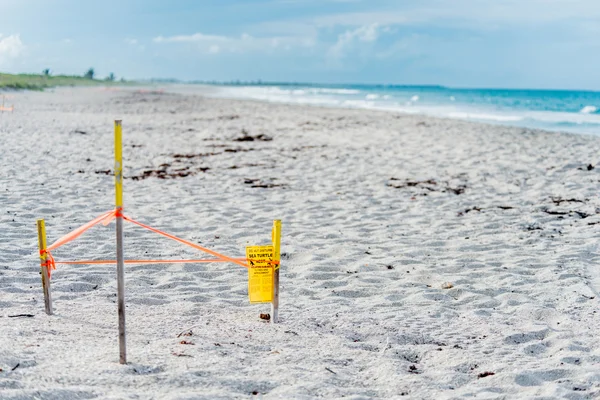Sea Turtle Nesting Season Has Begun 2021

The Sea Turtle Nesting Season has officially begun in South Florida. Researchers at the Loggerhead Marinelife Center have begun keeping an eye for the return of sea turtles nesting along the beaches in Northern Palm Beach County. The center has kicked off its “Respect the Locals” awareness campaign for beachgoers to be on the lookout for sea turtle nests.
Between March 1st and October 31st, sea turtle nest along the sandy 9.5 miles of beach that the Loggerhead Marinelife Center monitors. The 9.5 miles span between the northern Palm Beach County line to the northern boundary of John D. MacArthur Beach State Park. This area is one of the most populated sea turtle nesting areas in the world. The main reason why is the proximity to the Sargasso Sea, a region in the Atlantic Ocean and the gulf stream current that bends towards Florida.
Loggerheads, green, and leatherbacks nests are often found along the beach during the nesting season. The Loggerhead Marinelife Center in Juno Beach focuses their efforts on helping endangered and injured sea turtles before releasing them back into the ocean. The Marinelife Center monitors the beaches daily to provide care for the injured and sick sea turtles through their rehabilitation and research centers.
Last year, the Loggerhead Marinelife Center saw a record number of sea turtle nest along our beaches. The center documented 16,935 sea turtle nests totaling 286 leatherbacks, 13,059 loggerhead, and 3,590 green sea turtle nests.
During Sea Turtle Nesting season, it is especially important to help make sure our local beaches are clean. Here are some helping tips on how you can help or what to do if you spot a sea turtle nest.
Do:
Throw away any debris or trash left behind on the beach
Observe sea turtle nest from a distance
Fill in any holes with sand and help provide a clear pathway to and from the ocean
Do not:
Interact or disrupt sea turtle nesting’s – it is illegal
Bring or use balloons on the beach
Harm or Harass sea turtle, their nests, or hatchlings – it is illegal and sea turtles are protected by the United States Endangered Species Act of 1973 and the Florida Statute Chapter 370.



Leave A Comment